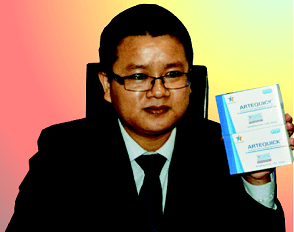
China-based pharmaceutical company, Artepharm, has explained why the company recently signed up the Artequick antimalarial drug for the Mobile Authentication Service (MAS).
Speaking with Pharmanews, Jeremy Hu, marketing director of the company, said that the move was necessary to ensure that only genuine products got to the end users without hitches.
Hu said that Nigeria had a huge market where several antimalarial drugs were always jostling for attention, adding that this had led to counterfeiting of such products in some quarters.
He stated that Artepharm’s subscription to MAS was a further demonstration of its commitment to the well-being and speedy recovery of patients, noting that the move became even more necessary when the company discovered that a faceless pharmaceutical outfit in the country was faking its product.
“It took the intervention of a court injunction to stop the act. This is why we encouraged patients and physicians alike to ensure that they scratch and authenticate the pin on each product before use,” he admonished.
The Chinese businessman observed that many consumers don’t bother scratching to authenticate the genuineness of the drug they procure, adding that this behaviour encourages imitators and fake drug peddlers to thrive.
Describing Artequick, the Chinese expert described the drug as a quick action, preventive, highly efficacious and low toxicity medication, with a side effect of less than three per cent.
“Artequick is a 4-tablet 2-day anti-malarial treatment. It is a new line generation of ACT combining Artemisinin and Piperaquine as its potent ingredients. Unlike most complex anti-malarial products in town, it is a short regimen drug (specifically a four-tablet dosage),” he said.
On the long term goal of Artepharm, the marketing director noted that arrangement was being concluded by the management to build a local factory in Nigeria within the next two to three years.
“Aside production of Artequick, which is marketed in Nigeria by Trusted Pharmacy and Chemist (West Africa), we are hoping to start reproducing other wide range of brands like antibiotics, hypertensive, diabetics, Azithromycin, Meropenem, Ceftriaxone, and Amoxicillin which are currently gaining ground in the market,” Hu revealed.
The Artepharm boss further said, “When compared with local production, I have observed that most pharmaceutical products here in Nigeria are mainly from India, China and Malaysia. I recall that China once experienced a similar situation in the 1980s.”
Going down memory lane, Mr Hu recalled that his countrymen had to deal with several issues when local pharmaceutical manufacturing companies were just blossoming in the 1980s.
“In the 1980s when China local medicines had not attained international status, the bulk of the drugs you saw around were from the West. Since the global brands that took over the Asian markets, such as GSK, Novartis, and Pfizer, were more or less using our resources, the need for joint ventures became paramount.
“Their presence were felt everywhere in the major cities. With such ventures came the needed experience and expertise for many Chinese entrepreneurs who ventured into full time pharma manufacturing,” he remarked.
The marketing director believes that Nigeria can equally benefit by encouraging global brands and foreign investors to build factories open up channel of local production and run joint ventures. He expressed optimism that with government’s backing, local pharma manufacturing would reach its peak.
For a self-acclaimed introvert, the Artepharm director who has been operating in Nigeria since 2009, was quick to acknowledge Nigerians as very hospitable, creative and hardworking people.
“I have travelled through the six geo-political zones of Nigeria. What I find remarkable is the fact that the huge population of market consumers gives a level playing field for new and existing companies to carve a niche for themselves and compete favourably. That, to me, is a plus for any developing nation,” he observed.
On why he thinks any company would want to risk introducing an anti-malarial drug into Nigeria when it is almost saturated with different innovator products and generics, Mr Hu declared that Artequick is different from the bulk of brands in the market.
According to him, Artepharm has come to realise that non-compliance, as a result of taking too many tablets for a length of time, is a challenge in eradicating malaria in Nigeria.










